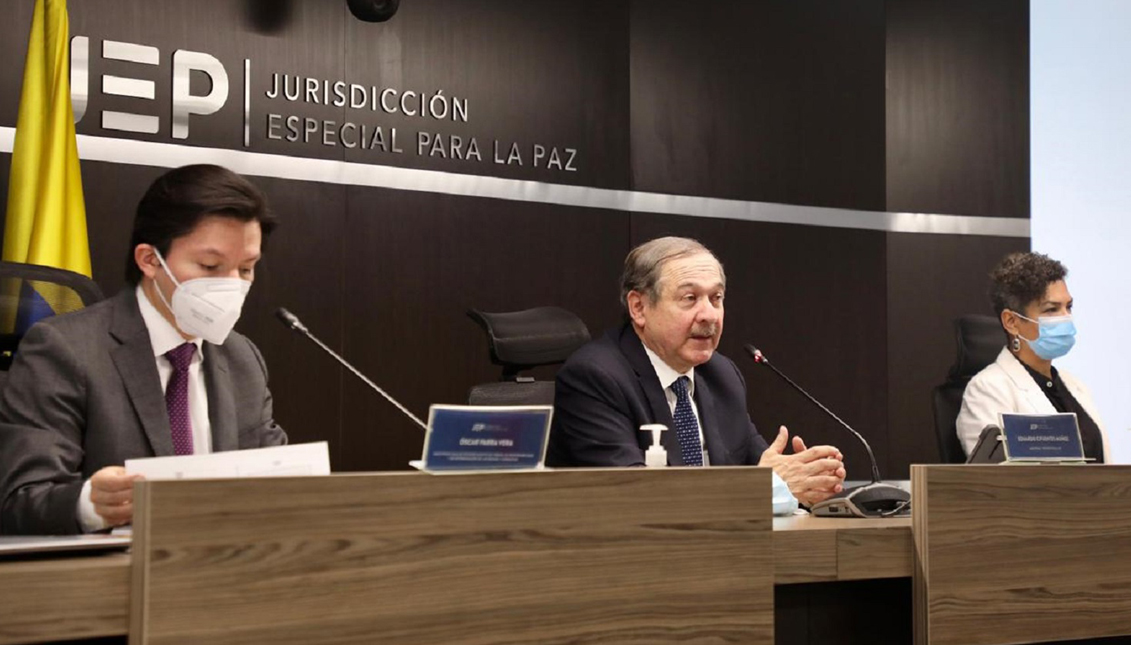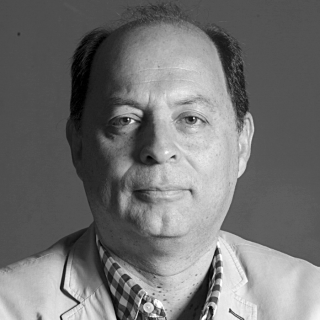
The Colombian military killed 127 civilians passing as guerrillas
The Special Jurisdiction for Peace (JEP), a high court created from the peace accords with the FARC, charged 15 soldiers with war crimes and crimes against…
On January 22, 2002, Jesús Emilio Márquez Gutiérrez was detained by a paramilitary commando and his family never saw him alive again. He was assassinated on Jan. 25, 16 days after Lieutenant Colonel Publio Hernán Mejía Gutiérrez assumed command of the La Popa Battalion, in Valledupar, on the Caribbean coast of Colombia.
He was the first of 127 men and women who were extrajudicially executed in a macabre plan designed by those who directed the operations of the Army unit in the area of northern Colombia. The purpose was to make civilians pass as guerrillas to obtain benefits such as days of rest or economic incentives and earn points with military achievements, which in reality, were serious violations of human rights.
This was recorded in the indictment of crimes against humanity of murder and forced disappearance of persons and the war crime of homicide, which was announced on Thursday, July 15 by the Reconnaissance Chamber of the Special Jurisdiction for Peace (JEP).
The high court was created in 2017 after the signing of the peace agreement between the Colombian State and the Revolutionary Armed Forces of Colombia-People's Army (FARC-EP) on Nov. 24, 2016. It is the transitional justice mechanism that investigates, clarifies, judges and punishes the most serious crimes that occurred in the context of the armed conflict until Dec. 1, 2016.
The measure involves two lieutenant colonels who commanded the battalion, as responsible for promoting and pressuring the murder of civilians, as part of the war declared against illegal far-left organizations.
Three majors, a lieutenant, two second lieutenants, two first sergeants, a first vice sergeant, a third corporal and three professional soldiers were also charged, who belonged to the Artillery Battalion No. 2 La Popa between Jan. 9, 2002 and Sept. 9, 2005. It is part of the investigations carried out by the JEP within the chapter of 'Assassinations and forced disappearances presented as casualties in combat by State agents' on the Caribbean Coast, and also in other areas of the country: Antioquia, Norte de Santander, Huila, Casanare and Meta.
A week ago, the JEP had also charged crimes against humanity and war against a group of soldiers from the Catatumbo region, in Norte de Santander, on the border with Venezuela. There, the main crimes involved a general, as well as two colonels, two lieutenant colonels, a major, a captain, two sergeants, a corporal and a civilian, for the murder of at least 120 people between January 2007 and August 2008.
Judge Eduardo Cifuentes, president of the JEP, pointed out Thursday that "the crime pattern in Catatumbo is repeated, with its own peculiarities, also in the La Popa Battalion."
In the announcement about the latter case, the JEP established Lieutenant Colonels Publio Hernán Mejía Gutiérrez (commander of the battalion between 2002 and 2003) and Juan Carlos Figueroa Suárez (between 2004 and 2005) as the main responsible parties. Mejía Gutiérrez has an active participation in social media, proclaims himself a pre-candidate for the Presidency and is supported by sectors of the extreme right connected with the Colombian government and with former president Álvaro Uribe Vélez.
Meanwhile, what is known about Figueroa Suárez is that he lives abroad and that there is no photo of him on the Internet.
The decision of the high court is consigned in a document of 418 pages of mainly military testimonies that confirm they murdered civilians as part of the dirty war against the guerrillas to show results before their superiors and get incentives. Furthermore, the strong pressure on the troops by superiors to achieve results is clear, regardless of whether civilians had to be killed and passed off as guerrillas "at any cost."
This is how Carlos Yobany Medina Bayona, former commander of several platoons, recounted it in his version before the JEP: “Colonel Mejía arrived with his arrogance and to treat me badly: 'you have to give results, you are stupid, a fool and look at your partner Lora how he kills, that man does have his balls on, you are an idiot, you are a fag, you are a nosequé.'”
For his part, the third corporal Elkin Rojas, squad commander, said that in “most of the training I was in, they always instilled that in me: being a murderer. It is what they always instilled in me, that I was going to carry the arms of the State. Everything I would have done was going to be legal."
It was established that they prepared documents for the operations after the crimes occurred with "information that would allow the murders to give a cloak of legality."
When Nelson Javier Llanos Quiñones related his version before the JEP, he referred to an incident with Colonel Hernán Mejía, commander at the time of the La Popa Batellón.
"At some point I met him and told him: 'my colonel, I don't have to make that report, last night there was no combat, last night he did not shoot himself.' The answer I received was practically the same as in the previous case: ‘brother, they are bandits and they have to die.’”
In 121 of the 127 murders investigated, the victims were reported as unidentified and their bodies were moved without the presence of the judicial police to obstruct the investigations. They were publicly shown with uniforms, weapons and war material from illegal groups to justify that they died in combat. They even carried out drills on the ground so that the communities believed that they were indeed clashes with members of the guerrilla.
One of the cases has to do with the murder of 17 men and a woman, which occurred on October 27, 2002. They were reported as members of the guerrillas of the National Liberation Army (ELN) without being, and the fact was presented as a great military achievement.
Likewise, the JEP indicated that between 2002 and 2003, there was an alliance between the battalion led by Colonel Mejía Gutiérrez with paramilitary groups, illegal far-right organizations, for joint actions. It is known that the paramilitaries, accused of serious human rights violations and allies of drug gangs, handed over 41 civilians alive to the battalion who ended up being executed.
Among those killed are 13 members of the Wiwa and Kankuamo indigenous communities, who live in that region of the country. One of the cases that most attracted the attention of the magistrates was that of a 13-year-old Wiwa indigenous girl who was pregnant.
What happened with the La Popa Battalion coincides with the end of the peace negotiations between the government of President Andrés Pastrana and the FARC-EP, on Feb. 20, 2002, and the beginning of an unprecedented military offensive, supported by the United States. It had its maximum support during the two presidential terms of Álvaro Uribe Vélez (2002-2010).
RELATED CONTENT
In these years, the war reached unsuspected limits and drastically affected the civilian population, especially in rural areas. It is estimated that 3,633,840 suffered firsthand the effects of the armed conflict, according to the Single Registry of Victims.
Added to the unleashed violence was impunity, which has been counteracted by the work of the JEP.
Referring to the case of the La Popa Battalion, Judge Cifuentes stated that “most of the perpetrators have confessed,” which implies that from the transitional justice of the JEP “there has been progress beyond ordinary justice, despite that the ordinary justice has given the first basis to these investigations.”
Of the 71 operations in which 127 civilians were killed, the ordinary criminal justice investigated 58 and the other 13 were in the hands of the Military Criminal Justice, which either shelved them or did not advance.
"The military agreed to present false statements before the ordinary justice and the Military Criminal Justice," said Judge Óscar Parra, magistrate of the JEP's Recognition Chamber, on Thursday. Thus, in three years, the JEP has done more than ordinary criminal justice and Military Criminal Justice in 20 years.
As happened in the La Popa Battalion, what happened in other military garrisons in the country is being investigated for the responsibility of at least 6,402 civilians extrajudicially executed, between 2002 and 2008, during one of the chapters of horror of war of more than 50 years in the South American country. These cases have been called "false positives" because they made it appear as a good result of the war, something that had nothing to do with the armed action against guerrilla groups.
Most of these cases occurred during the government of Álvaro Uribe Vélez, who has denied any connection with these events and has focused his discussion on the fact that it is all about manipulations of courts and human rights organizations close to the FARC. The former president even opposes the existence of the JEP, and has asked that the military not be tried there and the budget be reduced to the minimum.
The Democratic Center, the ruling party led by Uribe, and sectors of the retired military have said that the "false positives" are isolated events and that at no time were systematic.
However, as other magistrates have expressed, Eduardo Cifuentes, president of the JEP, pointed out on Thursday that "organized power apparatuses were entrenched in those military units, policies that were executed and therefore do not simply correspond to 'bad apples' , but to an organization that perverted the public force within it.”
There are 6,402 dead, identified by name and ID number according to the investigations carried out by the JEP, which has been informed by reports from the Office of the Attorney General of the Nation, the Ministry of Defense and victims' organizations and human rights organizations.
Before the JEP, former guerrilla and military combatants responsible for war crimes and crimes against humanity must confess the truth so as not to expose themselves to penalties exceeding 20 years in prison in ordinary justice.
In exchange for the truth, they are subjected to sanctions specific to the jurisdiction, such as forgiveness activities and symbolic and material reparation works, which are determined by the high court and the victims. The goal is to repair the damage done to people and communities.











LEAVE A COMMENT: